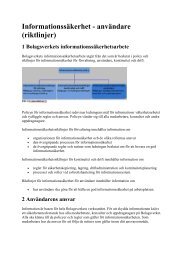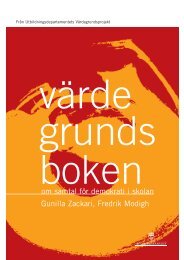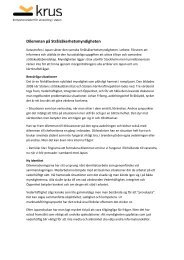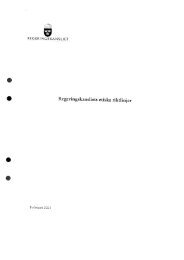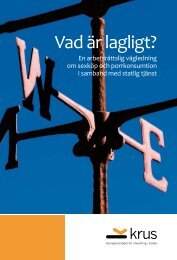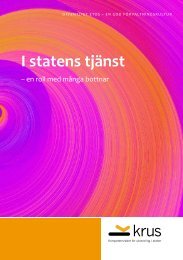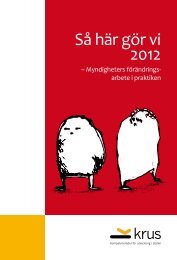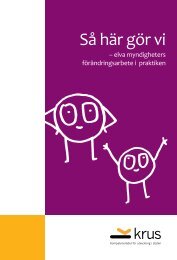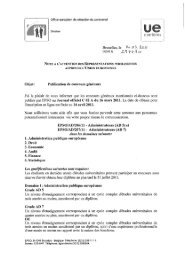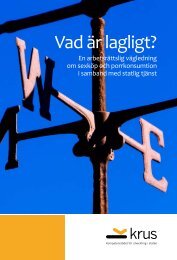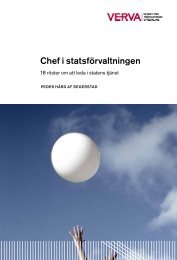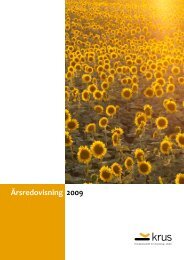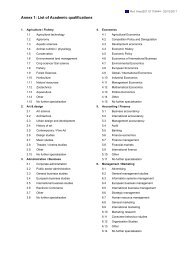Dialogkompetens i skolans vardag - Publikationer - LTU - Luleå ...
Dialogkompetens i skolans vardag - Publikationer - LTU - Luleå ...
Dialogkompetens i skolans vardag - Publikationer - LTU - Luleå ...
Create successful ePaper yourself
Turn your PDF publications into a flip-book with our unique Google optimized e-Paper software.
18 A.-C. Wennergren<br />
competence, interpretation competence and message competence. Transformed<br />
into the context of the current study, role competence can be understood as<br />
knowledge of different needs and strategies to be able to take the role of<br />
listener. Interpretation competence can be understood as awareness of how to<br />
contribute to a meaning-making context. Finally, message competence<br />
touches on the meaning of the category, conversation rules and can be<br />
understood as knowledge about how to participate in a dialogue and to be a<br />
giver and recipient of the content of a mutual exchange. There are three levels<br />
of message, the content (what), the relation (how it is said) and timing (when<br />
it is said). Combined with a hearing loss, Gullacksen (2002) points out that<br />
such competences are less robust and have to be developed with greater effort<br />
in comparison to hearing pupils in the same situation. According to the<br />
results of the present study, none of those competences can be put into<br />
practice without role competence concerning individual needs for taking an<br />
active part in the learning dialogue.<br />
When placing the results in the light of self-image and identity, there will<br />
always be a question of accepting the hearing loss before one can develop<br />
knowledge about how to participate in communication. At the same time,<br />
expectations about participation in meaning-making processes with peers<br />
are also of great value to the pupil’s self-image. Thus, one might ask what<br />
the consequences might be, if the limitations related to the hearing loss form<br />
the central focus. There is always a risk of difficulties if the hearing loss<br />
infringes too greatly upon the self-image. All attention focuses on the identity<br />
of being hard-of-hearing and the person herself/himself can become more or<br />
less invisible (Gullacksen 2002). When a learning dialogue can provide<br />
ownership of meaning and does not require a choice between meaningful<br />
identity and learning, it will also engage the individual’s identity (Wenger<br />
1998). To hear what is said does not necessarily mean to understand, and to<br />
create meaning and coherence in an utterance is difficult when only part of it<br />
is heard (cf. Preisler et al. 2005).<br />
During the process of change to promote a more dialogue-orientated<br />
classroom environment, initial questions lead to subsequent ones, such as, for<br />
example, how the question about the pupil’s listening strategies was<br />
expressed. The different levels of awareness have revealed that pupils<br />
have to be asked and to learn, in order to be aware of listening strategies.<br />
According to the different activities in the action research process, the<br />
teachers, pupils and the researcher have been through a learning process<br />
by conducting this project together. All of those involved have learned<br />
about needs and strategies in the school environment and thereby acquired<br />
knowledge about how to create more optimal conditions by the active<br />
solicitation of pupils’ opinions. To be asked is one way to make strategies<br />
explicit at a conscious level, but it might also be a way of trying to put<br />
words on more unconscious strategies. Since not every pupil in this<br />
study works actively to overcome problems, it implies a potential to<br />
develop both knowledge and strategies. In this socio-cultural context, selfimage<br />
and individual growth can be increased towards a more multi-voiced<br />
perception.



